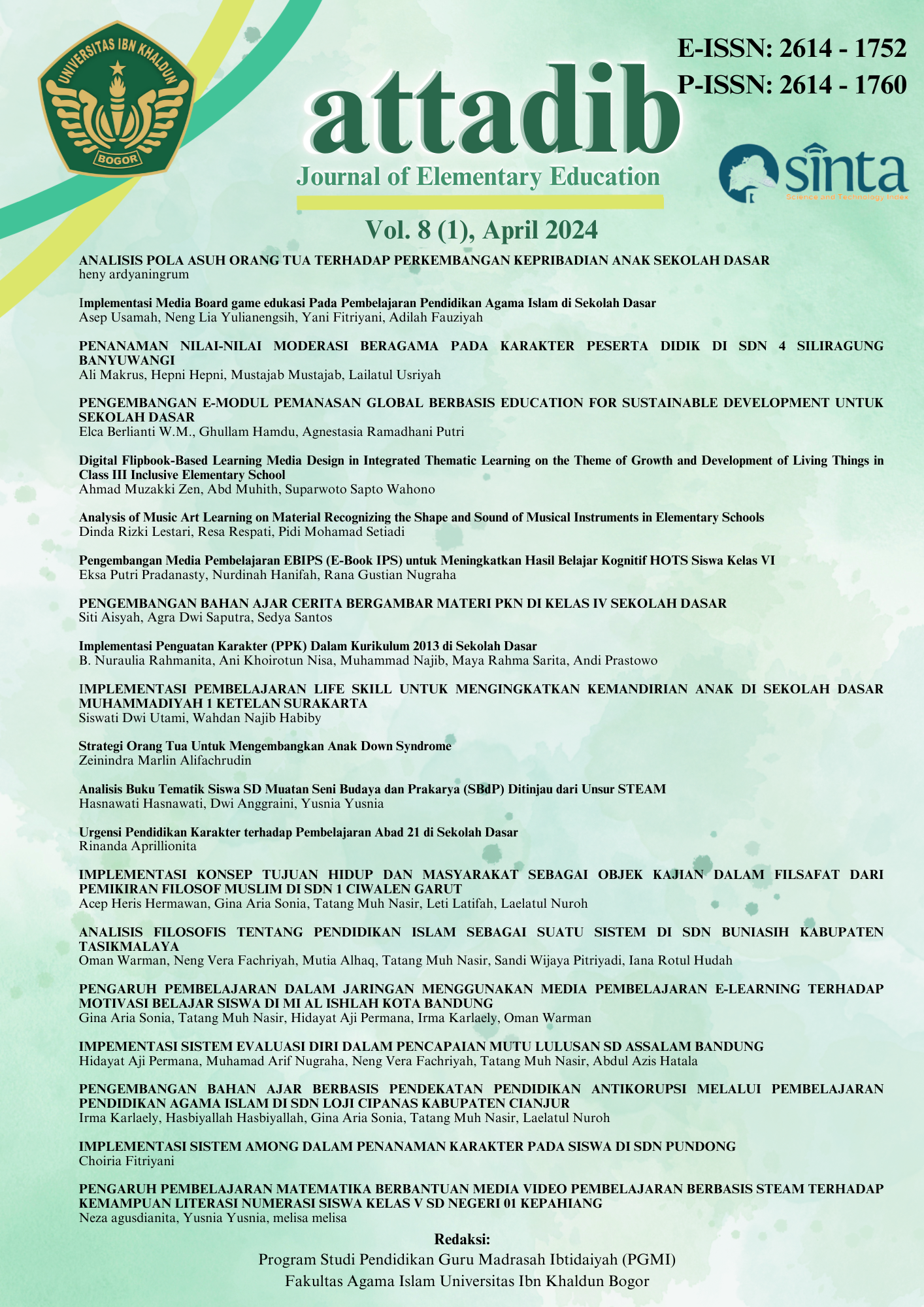PROSES PEMBELAJARAN PENDIDIKAN AGAMA ISLAM BAGI ANAK BERKEBUTUHAN KHUSUS DI SDN PERWIRA-KOTA BOGOR
DOI:
https://doi.org/10.32832/at-tadib.v2i1.19364Abstract
As citizens, incumbents have the same rights as other citizens. This ordinary school with an inclusive (integrated) orientation is the most effective means of combating discriminatory attitudes, creating people who are receptive to the arrival of extraordinary children, building a unified, integrated society and achieving education for all. The adjusted education principle in inclusion schools led to a large demand for regular teachers, in particular teachers of Islamic Education in the implementation of learning process of Islamic Religious Education for children with special needs in inclusive schools. The purpose of this study are: (1). To know the scope of PAI material at SDN Perwira-Kota Bogor, (2). To know the method used in the learning process of PAI, (3). To find out how PAI teachers evaluate the learning process, (4). To know the inhibiting factors for PAI teachers in implementing the
learning process of PAI, (5). To know the supporting factor in learning process of PAI, (6). To know how the implementation of learning process of PAI. The research method using qualitative method. The results showed that: 1). The scope of PAI material covers al-Qur'an, aqidah, morality, fiqh, and history of Islamic culture. 2). The methods used during the learning include, lecture method, discussion method, demonstration method, practice method, and question and answer method. 3). Evaluation of the learning process of PAI is to make a lattice problem in accordance with the competency standards of learning indicators, making items from each indicator, processing the test results, analyzing test results, and making improvements and enrichment. 4). The inhibiting factors for PAI teachers in implementing the learning process of PAI include internal and external factors. 5). Supporting factors in learning PAI on: learning experiences of learners and attention of parents to learners at home. 6). Implementation of learning process of PAI that is: a). Creating a Lesson Plan (RPP), b). Conducting learning activities in accordance with the
making of RPP.
References
Ganjar Eka Subakti, “Implementasi pendidikan agama islam di SD islam terpadu (Studi Deskriptif pada SD Plus Islam Terpadu Bhaskara Sukamelang-Subang Tahun 2010-2011)”. Jurnal Tarbawi, Vol. 1, No. 1, Maret 2012. Juni18, 2017) Http://Jurnal.Upi.Edu/File/03_Implementasi_Pendidikan_Agama_Islam_Di_Sd_Isl am_Terpadu_-_Ganjar_A.Pdf,
Glazzard, Et Al., (2016). Asah asih asuh anak berkebutuhan khusus di sekolah dasar, Yogyakarta: PT Kanisus.
Hasbullah. (2012). Dasar-dasar ilmu pendidikan, Jakarta: PT RajaGrafindo Persada.
Kerangka dasar dan struktur kurikulum tingkat sekolah dasar/madrasah ibtidaiyah. (2014). Jakarta: Media Pusaka.
Kustawan, Dedi, Budi Hermawan. (2016) Model implementasi pendidikan inklusif ramah anak. Jakarta Timur: PT Luxima Metro Media.
Murtie, Afin. (2016). Ensiklopedi anak berkebutuhan khusus, Jogjakarta: Maxima.
Nunung Nuriyah, “Evaluasi pembelajaran: sebuah kajian teori”. Jurnal Edueksos, Vol. 3, No. 1, Januari-Juni 2014.Juni 18, 2017.
https://www.syekhnurjati.ac.id/jurnal/index.php/edueksos/.../289
Praptiningrum, “Fenomena Penyelenggaraan Pendidikan Inklusi bagi Anak Berkebutuhan Khusus”. Jurnal Pendidikan Khusus, Vol. 7, No. 2, Nopember 2010. 30 Mei 2017 http://journal.uny.ac.id/index.php/jpk/article/view/774/601
Sanjaya, Wina. (2013). Strategi pembelajaran berorientasi standar proses pendidikan. Jakarta: Kencana Prenadamedia Group.
Santoso, Hargio.(2012). Cara memahami & mendidik anak berkebutuhan khusus, Yogyakarta: Gosyen Publishing.
Sugiyono. (2014). Metode penelitian kuantitatif kualitatif dan R&D. Bandung: Alfabeta.
Undang-undang Nomor 20 Tahun 2003 tentang Sistem Pendidikan Nasional & Undang-undang Nomor 14 Tahun 2005 tentang Guru dan Dosen (2008) Jakarta: Visimedia.
























